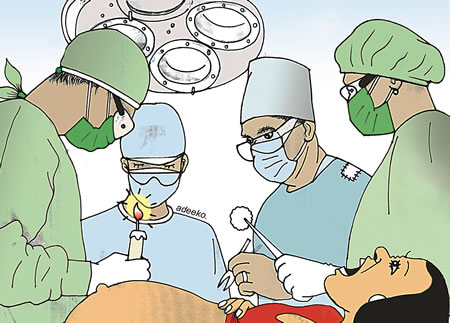Why we concentrate on security, infrastructure development ― Buhari
Nigeria’s National Health Insurance Scheme (NHIS) is a social security system established in 2005 that aims to guarantee the provision of good healthcare for enrollees by deducting policy fees from their salaries every month. Unfortunately, more than a decade after the establishment of the scheme, it has not only proved incapable of solving the country’s medical problems, but also impoverished numerous enrollees who put their trust in the scheme.
One of the main reasons why the NHIS is failing is because the scheme and its network of partners are plagued by corruption and mismanagement. As such, payments from hardworking citizens cannot guarantee good medical coverage when needed.
It is worrisome knowing that despite the disbursement of ₦411 billion to Health Management Organizations (HMOs) by the NHIS since 2005, HMOs still owe ₦2.2 billion to Health Care Providers (HCPs) across the country. Normally, the three agencies are supposed to ensure that the flow of deductions right from the moment it is in possession of the NHIS, is void of discrepancies which could affect the efficiency of the system. But this has not been the case and the NHIS often blame the HMOs for inefficiency.
To some extent, the blame is rightly directed. The HMOs are supposed to provide services to 450,000 Nigerians who are covered by NHIS, and to which service it (the HMOs) received an administrative fee of ₦60 billion in 12 years. It is surprising how the HMOs still struggle to provide services having received this much.
In the NHIS’s own words, it is clear that the payments Nigerians are making is enormous. It claims:
“For the public (federal) sector program, the employer pays 3.25% while the employee pays 1.75%, representing 5% of the employee’s consolidated salary. For the private sector and other tiers of government, the employer pays 10% while the employee pays 5% representing 15% of the employee’s basic salary.”
ALSO READ: Why we concentrate on security, infrastructure development ― Buhari
These are deductions that hardworking Nigerians can save for other serious financial commitments. Whereas, things are getting worse for the healthcare insurance system. In 2019, a report by The Cable Nigeria revealed that enrollees’ contributions create a pool of funds paid as capitation to HMOs for onward payment to hospitals. Unfortunately, the classic social insurance model which is intended to reduce the burden of paying out-of-pocket has been proven to increase poverty.
Innocent Nigerians cannot continue to dump money in the NHIS’s basket without results.
It is out of this frustration that in 2017, numerous petitions were filed by enrollees against the NHIS and the HMOs. Nothing concrete came of it besides a National Assembly’s Committee on Healthcare Services inquiry that concluded the NHIS is highly corrupt and its lack of transparency and accountability hinders its efficiency. As expected, enrollees and their employers were left unsatisfied.
Those that seek medical treatment in hospitals using their NHIS coverage still complain of bad services because their doctors cannot stop complaining about how the HMOs owe them huge fees. It is clear that NHIS needs an urgent overhaul. Even the Governing Council of the NHIS predicted in 2018 that the health insurance scheme was doomed to collapse in three years due to fraud within the agency and among its network.
Maybe it is time Nigeria scraps the NHIS altogether as former Minister of Health, Isaac Adewole suggested in 2017 when reacting to news of the disappearance of ₦531 billion from the agency’s coffers.
If the government is truly committed to making the country meet the Universal Health Coverage goal by 2030, it is either the NHIS is privatized or restructured. The government can also help the poor by cutting down the already hike taxes and levies which contribute to expensive private hospital bills. Like this, even the low-income earners would have access to quality and affordable health care they deserve.
Meanwhile, supporters of the scheme often reference the country’s commitment to global health improvement treaties. It is true that in 2015, Nigeria committed to the United Nations Sustainable Development Goals’ idea of achieving Universal Health Coverage in all member countries. But unfortunately, the Nigerian government’s framework for achieving this—the NHIS—is not working.
- Abdullah Tijani is a Writing Fellow at African Liberty and Local Coordinator at Students For Liberty. He is a law student at the Usmanu Danfodiyo University, Sokoto, Nigeria. He’s on Twitter @AbdullahAtijani.






